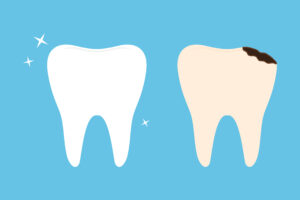 Cavities are a common problem that patients of all ages face. They can happen when plaque sticks to our teeth and begins to erode our enamel, forming a hole on our tooth. When you have cavities, they can typically be treated with dental fillings before they can cause any significant damage to your pearly whites. In our blog today, Dr. Stewart and his team in Livonia, MI are here to answer some common questions people may have about tooth decay.
Cavities are a common problem that patients of all ages face. They can happen when plaque sticks to our teeth and begins to erode our enamel, forming a hole on our tooth. When you have cavities, they can typically be treated with dental fillings before they can cause any significant damage to your pearly whites. In our blog today, Dr. Stewart and his team in Livonia, MI are here to answer some common questions people may have about tooth decay.
Why Do You Get Cavities When You Brush Your Teeth?
It’s likely that you will experience a cavity at least once throughout your lifetime. Tooth decay can happen when the bacteria from the food we eat sticks to our teeth. You may be able to avoid decay by brushing and flossing twice a day, but in some cases, you may still find out you have one (or several) cavities at your next dental checkup. This could happen for a few reasons, from your genetics to your oral hygiene practices. If you brush twice a day but frequently snack throughout the day, it could be the reason for your cavities. You can try limiting your snacks or drinking plenty of water between your snacks to reduce decay. If you are not brushing and flossing properly, you may not be removing the bacteria properly. You can ask your dentist for tips on improving your routine.
How Do Dental Fillings Treat Tooth Decay?
When you have a cavity, your dentist will most likely recommend a dental filling to restore your tooth. During this minimally invasive treatment, the decayed part of your tooth will be removed. This can help stop the progression of the decay and avoid further layers of your tooth becoming damaged. The area will then be thoroughly cleaned before stronger material is added. The composite resin used for this process will look natural and blend in with your tooth and is also highly durable. Filling the cavity helps provide extra protection and creates a seal from bacteria entering space. If you have a more severe cavity, a root canal may be necessary instead to remove the damaged pulp of your tooth.
Is It Normal For Cavities To Cause Discomfort?
You may not know that you have a cavity because it can take several months for it to show signs. In some cases, you may notice that your tooth is sensitive when eating something too hot or too cold. If the discomfort around the tooth is long lasting and cannot be relieved with a cold compact or pain reducers, it could be a sign of an infection or severe cavity.
Schedule An Appointment With Our Team
Do you need to treat a cavity? Schedule restorative treatments or other appointments with Dr. Stewart in Livonia, MI, today at 734-425-4400.


